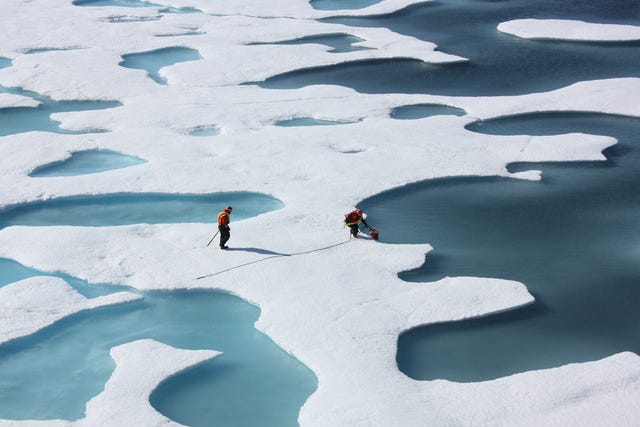It's OK to be stressed out about the impact even the slightest change in our climate could have on everyday life; research suggests rising water levels could reach high enough to overtake some seaside cities; another suggests a third of all plant and animal species could be extinct — because of habitat or temperature change — by 2050. Hell, we could be next. (But definitely still in the distant future: According to acclaimed climatologist Michael E. Mann — who might've been the inspiration for Leonardo DiCaprio's character in Don't Look Up — "there is no evidence of climate change scenarios that would render human beings extinct," he told LiveScience.)
However, climate change could make a more immediate impact on our skin. Human habits and material manufacturing contribute to the thinning of the ozone, which will increase the amount of UV rays that reach the surface, causing a spike in skin cancer cases, but also a domino effect of other issues.
A Connected Crisis: Climate Change and Skincare
"A 2 degree Celsius (3.6 degree Fahrenheit) increase in ambient temperature is estimated to increase skin cancer incidence 11 percent globally by 2050," Dr. Liia Ramachandra, a skincare expert, industry executive and researcher, says, citing a 2002 study from Jan C van der Leun and Frank R de Gruijl. "Heat also has an indirect effect on skin cancer incidence by altering human behavior."
11 percent is a huge spike, and that estimate was made some 20 years ago, when forecasts, to put it kindly, were more conservative and a little more hopeful humans could change their ways. Whether we can right our wrongs on a large enough scale to undo what many deem inevitable remains to be seen. But climate change itself is not up for debate. NASA has proven it's real.
"Earth's climate has changed throughout history," a recent NASA report begins. "Just in the last 650,000 years there have been seven cycles of glacial advance and retreat, with the abrupt end of the last ice age about 11,700 years ago marking the beginning of the modern climate era — and of human civilization. Most of these climate changes are attributed to very small variations in Earth’s orbit that change the amount of solar energy our planet receives... The current warming trend is of particular significance because it is unequivocally the result of human activity since the mid-20th century and proceeding at a rate that is unprecedented over millennia. It is undeniable that human activities have warmed the atmosphere, ocean, and land and that widespread and rapid changes in the atmosphere, ocean, cryosphere, and biosphere have occurred."
See? And skin doctors agree. They're prepping their patients as I write this. "Climate change is real and it is happening. Anticipating it and being prepared mentally and physically (skincare routine) is very important," Dr. Ramachandra says.
How to Protect Your Skin
Sure, a skincare routine shouldn't be most important part of your apocalypse plan to figure out. But it should be considered. "A variety of skin diseases appear to be worsened by climate change," Dr. Ramachandra explains. "This includes inflammatory disorders such as eczema (atopic dermatitis) and pemphigus (an autoimmune blistering disorder). We also know that emotional stress causes conditions such as eczema, vitiligo and psoriasis to flare [up]. This would be expected in communities that have been affected by natural disasters."
Less serious issues like acne can also be triggered by climate change. Someone who might've never had a breakout before (rare) might suddenly battle stubborn blackheads. "In warmer climates, increased heat and humidity can cause your skin to sweat, leaving you more prone to acne breakouts, especially if your skin is oily," Dr. Ramachandra says. This temperature rise can also increase cases of infectious skin diseases like Lymes — which is way more problematic than a few pimples. "An increase in Lyme disease is thought to be related to warmer environments that are more favorable to tick survival, as well as a greater availability of hosts like deer and mice," Dr. Ramachandra adds.
There are, however, steps you can take to protect yourself — even in spite of the inevitably of climate disaster. To start, Dr. Ramachandra suggests people "try to manage the stress climate change may cause." Easy enough, right? She also advises you "adjust your skincare routine according to the climate you live in."




















